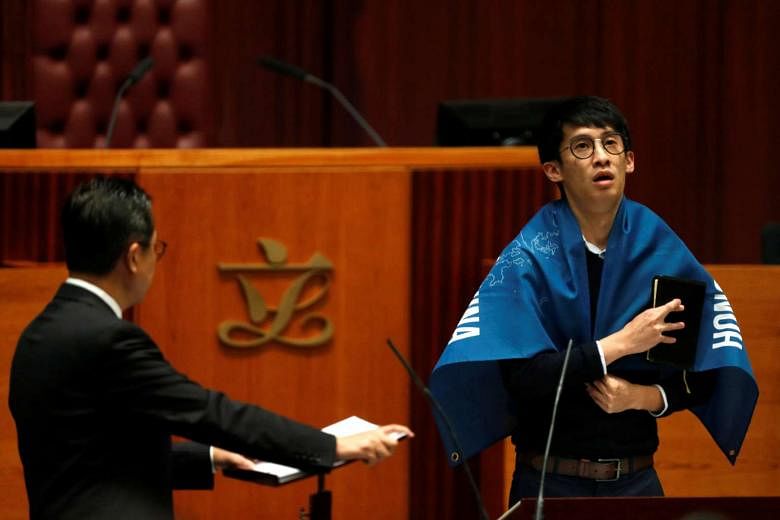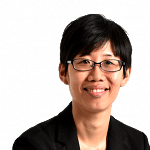BEIJING - China's Parliament made a rare unilateral interpretation of Hong Kong's mini-Constitution to bar two pro-independence lawmakers from taking their seats in the city's legislature, as their actions have touched raw nerves in Beijing, say analysts.
One factor is China's fear of a separatist movement deepening in the city with the pro-independence Hong Kong lawmakers taking office - and the contagion effect in restive Tibet or Xinjiang.
The other is the lawmakers' use of "Cheena" - a Japanese term for China, viewed by the Chinese as derogatory, given that Beijing remains embittered against Japan over the atrocities it committed during its invasion of China.
The two lawmakers - Mr Sixtus Leung, 30, and Ms Yau Wai Ching, 25 - refused to pledge allegiance to the city as part of China when they were being sworn into office in October.
They also altered some words in their oath and referred to China as "Cheena".
Mr Li Fei, head of the National People's Congress Basic Law committee, alluded to the two reasons at a Monday (Nov 7) briefing where he lashed out at the young lawmakers for having no sense of history. He recounted war atrocities committed by the Japanese in Hong Kong and likened the lawmakers to "traitors who sell out their country".
"If we do not stamp out (the separatists) in a timely fashion, it will seriously damage our sovereignty, safety and development, endangering Hong Kong's prosperity and stability," said Mr Li.
He pointed out that Article 104 of Hong Kong's Basic Law is essentially about political allegiance. "Requiring office holders to have political allegiance (to China) is a matter of course," he said.
The interpretation serves the purpose of "reiterating and emphasising" the essence of Article 104, he added.
Several state-run Chinese media also carried editorials and commentaries reiterating Beijing's strong stance in nipping separatist sentiments in the bud.
The central government "will show no mercy" in fighting pro-independence forces, said the People's Daily in a commentary on Tuesday (Nov 8).
"By advocating Hong Kong independence, the young lawmakers are challenging the sovereignty of the country. This will not be allowed nor tolerated in any country," said law professor Zou Pingxue from Shenzhen University.
Professor Zou said that being elected representatives, the lawmakers are clearly different from the man on the street.
"The central government has the responsibility to take steps to punish them and prevent similar cases in future," said Prof Zou.
Agreeing, Professor Zhang Dinghuai, deputy director of the Centre for Basic Laws of Hong Kong and Macao at Shenzhen University, said with seven pro-independence lawmakers elected, it's a very "serious problem" for Beijing.
Given that Hong Kong is an elitist society where politicians like lawmakers have the power to influence the masses, the central government cannot allow pro-independence sentiments to fester, and "poison the entire Hong Kong society", said Prof Zhang.
The interpretation also serves to "educate" the Hong Kong public on Beijing's political red line, which calls for adherence to the "One Country, Two Systems" premise, he added.
Hong Kong was granted autonomy under this premise after it was handed back to China in 1997.
Prof Zhang also noted that the two lawmakers had also insulted "all Chinese people" by using the Japanese word "Cheena" to refer to China during their oath-taking, and has incurred widespread public resentment.
"If no actions are taken, people in the mainland will think that the central government is too weak," he said.



